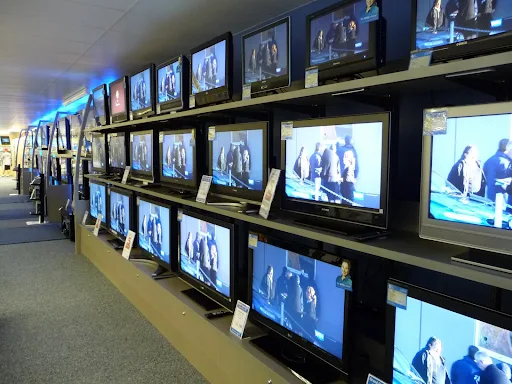Welcome to Insidus, your source for the latest DStv and Openview channel news in South Africa
SABC Looking To Produce And License Content To Netflix And MultiChoice
SABC Looking To Curate Exclusive Content For SABC+
ICYMI: SuperSport Schools Was Apparently Set To Launch On SABC+ But That Got Delayed
SABC Looking To Launch Openview Competitor
With the government set to turnoff (and delay) the analogue signals by 31 March 2025, SABC, e.tv and several provincial stations are set to lose under 5 million consumers. In the past year, SABC and eMedia's top shows experienced a ratings dip and with these turnoffs it will be hard for these stations to generate enough ad revenue.
SuperSport Schools Teasing Something Regarding The SABC
Why Some Consumers Haven't Lost Hope On SABC And MultiChoice Just Yet?
MultiChoice And SABC Settle Dispute With eMedia Investments Regarding Sports
MultiChoice Heading To Court Over Controversial SABC Deal
MultiChoice is currently appealing a ruling from South Africa’s Competition Commission, which stated that its 2013 agreement with the South African Broadcasting Corporation (SABC) constituted an unreported merger. The deal, which centered around the distribution of television content between the two companies, has sparked controversy due to its involvement in the ongoing digital terrestrial television (DTT) migration and its clauses that allegedly influenced SABC’s stance on encryption.
The Competition Commission found that the agreement, particularly its encryption clause, effectively restricted competition by protecting MultiChoice’s dominant position in the pay-TV market. The SABC had previously alternated its position on encryption, but in the agreement, it committed to not encrypt its free-to-air channels on the DTT platform, thus preventing new competitors from entering the market. This influence over the SABC’s policy constituted a merger, according to the Competition Act, which requires such mergers to be notified and approved by the competition authorities before implementation.
MultiChoice insists that the 2013 agreement was a typical business arrangement and that it should not be categorised as a merger. They argue that no anti-competitive intent was involved, and that the deal was in line with standard content-sharing practices. However, the Competition Commission has recommended that the Competition Tribunal treat the agreement as a merger and seek regulatory approval, further proposing potential proceedings against both MultiChoice and the SABC for failing to adhere to the notification requirements.
The ongoing appeal highlights tensions between corporate interests and regulatory oversight in the South African broadcasting sector. The outcome could have significant implications for the future of digital migration, competition laws, and the relationship between public broadcasters and private media giants.
This case has been under scrutiny for several years, with earlier efforts to challenge the deal dismissed due to insufficient evidence. However, new investigations have provided fresh insights that suggest the agreement warranted closer examination under competition law. As the case develops, it will continue to be a focal point for both industry watchers and regulators.
SABC And e.TV Are Likely To Be Reliant On DStv As Millions Of Households Still Recieving Analogue Signals Will Be Left In The Dark
How SABC's Proposal To Let MultiChoice Collect TV Licence Affects DStv?
SABC Fails To Launch Additional Channels To Openview, Could There Be More To The Story?
MultiChoice's DStv And The SABC Are Becoming A Thing Of The Past
Why Openview Consumers Are Now Able To Watch Games Exclusive To SuperSport And DStv?
A few years ago, SuperSport which serves as one of the largest sports broadcasters in Africa offering a wide range of sports ranging from football, rugby, tennis, boxing and wrestling formalised an agreement with the SABC for Betway Premiership. Initially, these games could have been viewed on rival broadcasters like Openview alongside SABC:s DTT.
In recent years, SuperSport decided to add some restrictions to these agreements when licensing them to the SABC that included blocking transmission from being received to Openview consumers. This benefited the SABC as they would be paying much less for these rights and it prompted eMedia Investments to take legal action.
Several punches were thrown during this time with eMedia Investments accusing SuperSport of an abuse in power while they accused them of "free riding". eMedia Investments' didn't need to pay for these games as they were being broadcast on SABC 1 so this was basically burdened to the SABC at the time eMedia Investments lost this battle.
They built up another case this time pertaining to the restrictions put up by SuperSport and they took this matter to the Competition Tribunal who deemed such agreement "unlawful" or "unethical" and requested both SABC and SuperSport make their games accessible to Openview. SuperSport did warn in advance that if this were to be the predicted outcome the whole agreement would be scrapped which is exactly what happened.
Several months later, both broadcasters are able to hold hands and announce a new agreement for PSL but what caught the media's attention is the number of games being offered on the table. When SuperSport would offer 240-260 PSL games SABC would offer almost half of that but that wasn't the case here as the offering was lessened to 51 games.
In short, when SuperSport and SABC were told to lift the veil from Openview these matches became expensive and following increased pressure by several governing bodies SuperSport couldn't just refuse to sell the matches to the SABC. So rather whatever amount SABC was willing to put on the table would determine how many games they'd get being 51.
In light of this one could say that SuperSport's free-to-air rights had been limited to the amount of games a broadcaster can carry of course they can't oppose who can or cannot use the exact platforms for the same offering.






















